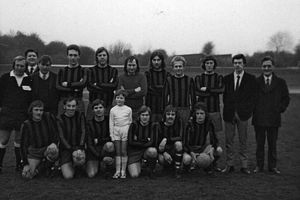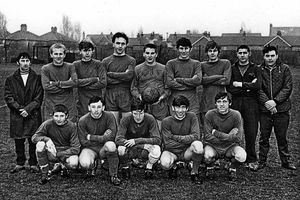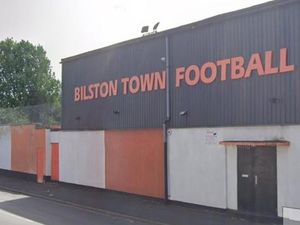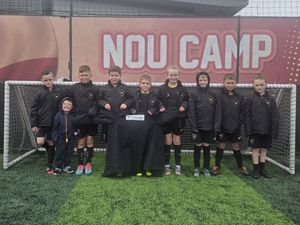Final whistle for the Combination League
Wolves legend Steve Bull used to go hunting for goals in it, but now more than a century of Wolverhampton footballing history is ending.
The Wolverhampton Combination has folded after 113 years in its current and former guise as the Wolverhampton Amateur League (founded in 1903).
Just four teams – Shere Punjab, Emerald Athletic, new side Codsall High School Old Boys and All Nations – registered to play this season.
The closure of the league means two established competitions in the region have folded in recent weeks after the demise of the Dudley and Cradley Heath League.
"It's the end of an era," said secretary Eddie Yardley, who is 69 and has been involved in the league since 1967.
"We had to cease running for this season and put a letter out because we can't run with four teams.

"It was a shock when I had to make the decision last week but it just wasn't financially viable.
"I'm devastated. I can remember going back to the 1960s when I played, there were over 200 teams playing football in Wolverhampton on a Saturday afternoon across the two leagues. Now there are only about 12-15.
Struggled
"That's how bad it is – I've done a little survey of all the local Saturday afternoon leagues myself at this standard and across the Birmingham AFA, the Staffs County League, the West Midlands League and the Midland Combination.
"We've really struggled to attract teams for the last two years but ever since the 1990s, football in this area has started to dwindle at an alarming rate.
"All that's left at our level now is what was the Birmingham AFA, the Staffs County League and the Christian League, which is on a Saturday morning.
"I don't think the FA does enough – you can apply for things but there's a limit to what they can do and there's no financial support for the open age group leagues at all."
The halcyon days of the two leagues that became the Combination came in the 60s.

Yardley, who lives in Tettenhall Wood, was a goalkeeper who first started playing in the Amateur League in 1962 for Black Country Deaf, then St Peters and then the Tettenhall Club which changed its name to Compton, a club he was associated with for 46 years to 2009.
Yardley revealed Wolves' record scorer Bull played for Tipton Town reserves as a youngster in the Amateur League in the early 1980s before progressing to Tipton's side in the West Midlands League from where he was snapped up by Albion.
"There were lots of famous names who played in the league and Steve Bull was one of them for Tipton," said Yardley.
"The old Goodyear team was a phenomenal side, as were Hobsons which later became Aero Lucas and Marstons, but Northicote Old Boys were probably the best team on a Saturday afternoon for many years."
A decision was first taken to amalgamate the Works League and Amateur League into the Combination in 1996 to safeguard Saturday afternoon football in the Wolverhampton area.
"There was a bitter rivalry between the leagues and people thought they would never get together, but by the 90s it was clear something had to be done and we managed to come to an agreement," said Yardley.
Stan Warner became the Combination's first president after such administrative stalwarts as Fred David and his father Arthur, Frank Taft, Norman Wixon, Tony Simcock and Jim Cartwright had run the rival leagues for many years.
Since 2002, the Combination has only once had two divisions, in 2009-10, of 10 and 12 teams, while they have usually run with one division of 14 clubs.
Yardley puts the decline down to two reasons.
"Finance and lack of interest," he said. "It costs around £100 to put a home game on with the pitch costing £60 (£72 if clubs aren't in a VAT exemption scheme where the league books the pitches in advance), a referee £27 and a linesman £18 each, so it's dear. When you ask club secretaries why they're pulling out, seven out of 10 of them say 'lack of interest'.
"Pubs often used to sponsor teams, but with the decline in the pub trade and people not supporting the licensees by going back to the pubs afterwards, why should they support the teams?
"Then there are the different choices nowadays, with seven-day opening at the shops.

"In the 60s not everyone had a TV, now everyone has loads of channels and computer games.
"We can only hope there will be a resurgence in the future."
The lack of interest is an alarming development caused, in Yardley's opinion, by the increased emphasis of the FA on organised football at much younger age groups.
"With the FA starting the players off at younger and younger ages – five to six-years-old – once they get to 15 or 16, they've been playing organised football for 10 years and they've either had enough of it or there is so much else to do," said Yardley.
"In my day the only organised football was playing for a local youth club."
As well as the decline in popularity, Yardley believes the quality of the football in the league got diluted over the years.
Problem
"The quality of the players was far better than it is today because of the amount of players in it," he said.
"Very few new teams started up in the West Midlands area and it's become a very big problem. When the standard started to decline in the 1980s most of the better teams moved up to the West Midlands League (then the Banks's League) or the Midland Combination."
Sadly, the only element of the Combination set to survive will be the Baker Cup, which started in 1911-12 and had its original entrants' crests inscribed on its trophy, and has had its last five finals at Molineux.
"All good things come to an end, but it gets in your blood and when that happens, you want to pass it on and try to help others," said Yardley."I'd love to see it start up again but I have my doubts."




